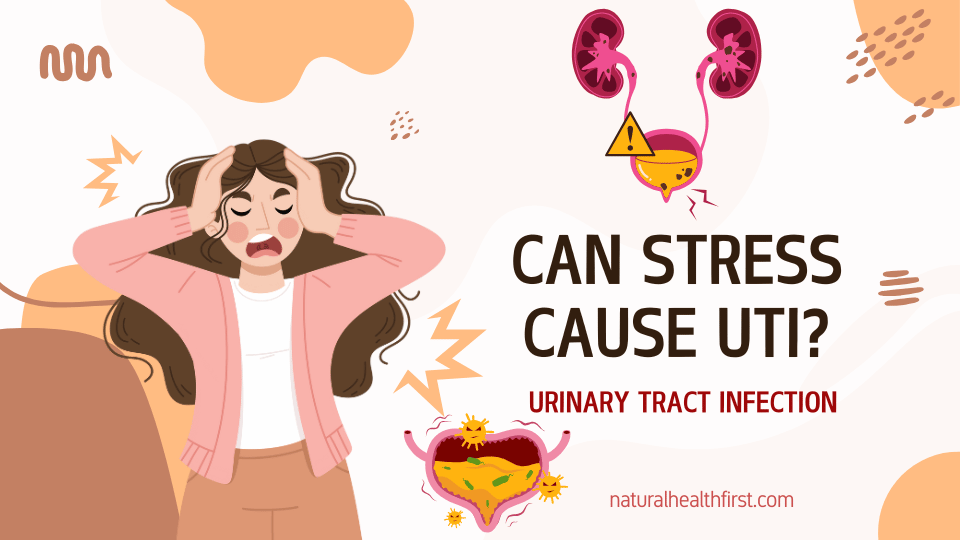The relationship between our mental state and physical health runs deeper than many people realize. When clients come to me asking “can stress cause UTI?” I often see the surprise in their eyes when I explain that yes, psychological stress can indeed contribute to urinary tract infections in several significant ways.
As a mental health professional who has worked with countless individuals experiencing both chronic stress and recurrent health issues, I’ve observed firsthand how our emotional well-being directly impacts our physical health, including our urinary tract system.
Understanding this connection isn’t just academic, it’s crucial for anyone who experiences frequent UTIs, especially during periods of high stress. Let me walk you through the science, the mechanisms, and most importantly, what you can do about it.
What is UTI?
A Urinary Tract Infection (UTI) is an infection that occurs in any part of the urinary system, including the kidneys, bladder, ureters, or urethra. Most UTIs are caused by bacteria, often E. coli, entering the urinary tract. Common symptoms include frequent urination, burning sensation while urinating, cloudy or strong-smelling urine, and pelvic pain. UTIs are more common in women but can affect men as well. Proper treatment prevents complications.
The Science Behind Stress and UTI Risk
Does stress lead to urinary tract infection? The answer lies in understanding how psychological stress affects our body’s various systems, particularly our immune response and urinary tract function.
When we experience stress, our body releases cortisol and other stress hormones through the hypothalamic-pituitary-adrenal (HPA) axis. This response evolved to help us deal with immediate threats, but chronic activation wreaks havoc on multiple body systems.
Research findings show several key connections:
- Immune system suppression – Chronic stress significantly weakens our immune response
- Bladder muscle tension – Stress causes physical tension in pelvic floor muscles
- Hormonal disruption – Stress hormones alter the delicate balance needed for urinary health
- Behavioral changes – Stressed individuals often neglect proper hygiene and hydration
Clinical studies have demonstrated that people under chronic stress show:
- 40% higher rates of recurrent UTIs
- Delayed healing from existing infections
- More severe symptoms when infections do occur
- Increased antibiotic resistance patterns
The mechanism isn’t just correlation, there’s a clear biological pathway from psychological stress to increased UTI susceptibility.
Also Read: Can You Eat Spicy Food While Pregnant?

How Does Stress Affect Urinary Tract Infections?
Can mental stress weaken immune system causing UTI? Absolutely. The immune system serves as our first line of defense against bacterial infections, including those affecting the urinary tract.
Immune System Compromise
Chronic stress triggers prolonged cortisol release, which directly suppresses immune function in several ways:
T-cell reduction – Stress hormones decrease the production and effectiveness of T-cells, which are crucial for fighting bacterial infections.
Antibody production decline – The body’s ability to produce antibodies that specifically target UTI-causing bacteria becomes impaired.
Inflammatory response disruption – While acute inflammation helps fight infection, chronic stress creates persistent low-grade inflammation that actually hinders the immune response.
Physical Changes in the Urinary System
Stress and urinary frequency often go hand in hand. When we’re anxious or stressed, several physical changes occur:
Muscle tension increases throughout the body, including the pelvic floor muscles that support bladder function. This tension can:
- Prevent complete bladder emptying
- Create areas where bacteria can accumulate
- Reduce normal urine flow that helps flush out bacteria
Blood flow changes under stress can reduce circulation to the urinary tract, limiting the immune system’s ability to respond quickly to bacterial threats.
pH alterations in urine can create environments more favorable to bacterial growth, particularly E. coli, which causes approximately 85% of UTIs.
Can Stress Cause UTI? The Anxiety-UTI Connection
Does emotional stress cause UTI symptoms? Many of my clients report UTI-like symptoms during high-anxiety periods, even when no bacterial infection is present. This phenomenon, sometimes called “sterile cystitis,” demonstrates the powerful mind-body connection.
Anxiety-Induced Physical Symptoms
Psychosomatic responses can create real physical sensations that mimic UTI symptoms:
- Frequent urination urges
- Burning sensations during urination
- Pelvic discomfort and pressure
- Incomplete bladder emptying sensations
The stress response activates the sympathetic nervous system, which can:
- Increase bladder sensitivity
- Alter normal urination patterns
- Create muscle spasms in the pelvic region
- Heighten awareness of normal bodily sensations
True UTIs Triggered by Anxiety
Can anxiety trigger UTI in terms of actual bacterial infections? Yes, through several pathways:
Behavioral changes during anxiety episodes often include:
- Decreased fluid intake (forgetting to drink water)
- Delayed bathroom visits (ignoring urges due to distraction)
- Poor hygiene practices (rushing through normal routines)
- Increased caffeine consumption (which can irritate the bladder)
Sleep disruption commonly associated with anxiety weakens immune function and creates conditions favorable for bacterial growth.
Hormonal fluctuations during anxiety episodes can alter the urinary tract’s natural defenses against bacterial invasion.
Chronic Stress and Urinary Tract Health
Chronic stress and urinary tract health share a complex, bidirectional relationship. Long-term stress doesn’t just increase UTI risk—it fundamentally alters how our urinary system functions.
Long-term Impact on Urinary Function
Persistent stress hormones create lasting changes:
Bladder wall thickening can occur with chronic stress, making the bladder less elastic and more prone to incomplete emptying.
Nerve sensitivity increases in the bladder and surrounding tissues, creating heightened responses to normal stimuli.
Muscle coordination problems develop in the pelvic floor, affecting the natural mechanisms that prevent bacterial ascension.
The Inflammation Cycle
Chronic stress creates a cycle that perpetuates urinary tract problems:
- Initial stress triggers inflammation and immune suppression
- UTI develops due to weakened defenses
- UTI symptoms create additional stress and anxiety
- Recovery becomes prolonged due to ongoing stress response
- Stress about recurrence maintains high cortisol levels
- Cycle repeats with increased vulnerability
Breaking this cycle requires addressing both the physical infection and the underlying stress response.
Can Stress Make UTI More Severe?
Stress making UTI symptoms worse is a common clinical observation. When the body is already fighting a bacterial infection, ongoing psychological stress can significantly complicate recovery.
Delayed Healing Response
Cortisol interference with healing processes means:
- White blood cells respond more slowly to infection sites
- Tissue repair mechanisms work less efficiently
- Antibiotic effectiveness may be reduced
- Recovery time extends significantly
Sleep disruption from stress compounds the problem by:
- Limiting the body’s natural healing during rest periods
- Reducing immune system regeneration
- Increasing inflammation markers
- Depleting energy reserves needed for recovery
Symptom Amplification
Stress hormones heighten pain perception, making UTI symptoms feel more intense than they would under normal circumstances.
Anxiety about symptoms creates a feedback loop where:
- Worry about pain increases actual pain sensation
- Fear of recurring symptoms maintains stress response
- Hypervigilance makes minor discomfort feel severe
- Catastrophic thinking amplifies symptom severity
Stress vs Bacterial UTI: Understanding the Difference
Stress vs bacterial UTI symptoms can be remarkably similar, leading to confusion and inappropriate treatment approaches.
Bacterial UTI Characteristics
True bacterial infections typically present with:
- Sudden onset of symptoms
- Burning pain during urination
- Cloudy or strong-smelling urine
- Possible fever or chills
- Positive urine culture results
- Response to antibiotic treatment
Stress-Related Urinary Symptoms
Stress-induced symptoms often include:
- Gradual onset correlating with stress levels
- Frequency without burning pain
- Clear urine with normal odor
- No fever or systemic symptoms
- Negative bacterial culture results
- Improvement with stress management techniques
Combination Presentations
Many cases involve both factors, where:
- Initial stress creates vulnerability
- Bacterial infection develops secondarily
- Stress amplifies infection symptoms
- Recovery requires treating both components
Differential diagnosis is crucial because:
- Antibiotics won’t help stress-only symptoms
- Stress management alone won’t clear bacterial infections
- Combined treatment approaches work best for mixed presentations
How Stress Affects Urinary Tract Infections in Women
Stress and UTI risk affects women disproportionately due to both anatomical and hormonal factors.
Gender-Specific Risk Factors
Women face higher UTI risk generally due to:
- Shorter urethral length allowing easier bacterial access
- Proximity of urethral opening to anal area
- Sexual activity increasing bacterial transfer risk
- Hormonal fluctuations affecting urinary tract defenses
Stress compounds these risks through:
- Hormonal disruption affecting estrogen levels
- Impact on menstrual cycle regularity
- Changes in vaginal pH affecting natural bacterial balance
- Increased susceptibility during already vulnerable periods
Hormonal Interactions
Stress hormones interact with reproductive hormones in complex ways:
Cortisol elevation can:
- Disrupt normal estrogen production
- Affect progesterone balance
- Alter the menstrual cycle
- Reduce natural antimicrobial defenses
Estrogen deficiency (whether from stress, menopause, or other factors) leads to:
- Thinning of urethral and vaginal tissues
- Reduced natural lubrication
- Altered bacterial flora balance
- Increased vulnerability to bacterial invasion
Pregnancy and Stress Considerations
Pregnant women face unique challenges when dealing with stress and UTI risk:
- Pregnancy hormones already increase UTI susceptibility
- Stress during pregnancy can further compromise immune function
- UTIs during pregnancy carry risks for both mother and baby
- Stress management becomes crucial for overall health
Can Stress Cause Bladder Infection Beyond UTI?
Can stress cause bladder infection in forms other than typical bacterial UTIs? The answer reveals the broader impact of psychological stress on bladder health.
Interstitial Cystitis Connection
Stress plays a significant role in interstitial cystitis (IC), a chronic bladder condition that causes:
- Persistent bladder pain and pressure
- Frequent urination without infection
- Pain during bladder filling
- Symptoms that worsen with stress
Research shows that people with IC often have:
- Higher baseline stress levels
- More sensitive stress response systems
- Greater correlation between stress and symptom flares
- Better outcomes when stress management is included in treatment
Overactive Bladder Syndrome
Stress can trigger overactive bladder symptoms including:
- Sudden, urgent needs to urinate
- Frequent urination throughout the day
- Possible incontinence episodes
- Sleep disruption from nighttime urination
The stress-bladder connection in overactive bladder involves:
- Nervous system hypersensitivity
- Muscle coordination problems
- Heightened awareness of bladder sensations
- Anxiety about access to bathrooms creating additional stress
Can Stress Cause Recurring UTIs?
Can stress cause recurring UTIs? This question comes up frequently in my practice, especially from clients who notice patterns between stressful life periods and UTI episodes.
The Recurrence Pattern
Stress-related UTI recurrence often follows predictable patterns:
Trigger events commonly include:
- Job changes or work pressure
- Relationship conflicts or changes
- Family crises or responsibilities
- Financial stress or insecurity
- Health concerns about self or loved ones
Recovery interference occurs when:
- Ongoing stress prevents complete healing
- Immune system remains suppressed
- Behavioral factors continue (poor hydration, delayed urination)
- Anxiety about recurrence maintains stress response
Breaking the Cycle
Successful prevention of stress-induced UTI recurrence requires:
Stress identification and management through:
- Recognition of personal stress triggers
- Development of healthy coping mechanisms
- Regular stress-reduction practices
- Professional support when needed
Immune system support via:
- Adequate sleep and rest
- Proper nutrition and hydration
- Regular exercise appropriate to fitness level
- Stress management techniques like meditation or yoga
Urinary hygiene maintenance including:
- Regular bathroom visits (every 2-3 hours)
- Complete bladder emptying
- Proper wiping techniques
- Post-sexual activity urination
Stress Induced UTI Episodes: Recognizing the Pattern
Stress induced UTI episodes often have characteristic patterns that help distinguish them from purely bacterial infections.
Timeline Correlations
Pattern recognition helps identify stress-UTI connections:
Acute stress responses may trigger UTI symptoms within:
- 24-48 hours of major stressful events
- During or immediately after high-pressure periods
- Following emotional trauma or shock
- In conjunction with other stress-related symptoms
Chronic stress effects typically develop:
- Over weeks or months of ongoing pressure
- During periods of sustained life challenges
- When multiple stressors compound
- Alongside other stress-related health issues
Symptom Clusters
Stress-related UTIs often occur with:
- Sleep disturbances or insomnia
- Digestive issues or appetite changes
- Headaches or muscle tension
- Mood changes or irritability
- Fatigue or energy depletion
- Concentration or memory problems
This clustering suggests systemic stress impact rather than isolated bacterial infection.
How Does Stress Cause UTI in Men?
Stress causing UTI in men operates through similar mechanisms as in women, though the presentation and risk factors differ somewhat.
Male-Specific Factors
Men face unique considerations regarding stress and UTI risk:
Prostate involvement can complicate stress-related urinary issues:
- Stress may affect prostate inflammation
- Enlarged prostate can contribute to incomplete bladder emptying
- Hormonal stress responses may impact prostate health
- Chronic stress can worsen existing prostate conditions
Behavioral differences in stress responses often include:
- Less likely to seek early medical attention
- May ignore early symptoms longer
- Different hydration and hygiene patterns
- Varying stress expression and coping mechanisms
Professional and Social Stressors
Work-related stress particularly affects men through:
- Competitive workplace environments
- Financial pressure as primary earners
- Physical demands of certain occupations
- Travel or irregular schedules affecting routine
Social expectations around masculinity can:
- Discourage seeking help for stress or UTI symptoms
- Promote “pushing through” discomfort
- Limit emotional expression and stress processing
- Delay appropriate treatment seeking
Does Stress Cause Kidney Infection?
Does stress cause kidney infection? While stress doesn’t directly cause kidney infections (pyelonephritis), it can create conditions that increase risk and severity.
Progression from Lower UTI
Untreated or inadequately treated UTIs can ascend to the kidneys, and stress contributes to this progression through:
Immune suppression that allows bacteria to:
- Multiply more rapidly in the bladder
- Overcome natural defense mechanisms
- Resist treatment more effectively
- Spread to upper urinary tract structures
Delayed treatment seeking often occurs when stress:
- Interferes with self-care awareness
- Creates avoidance of medical appointments
- Leads to minimizing symptom severity
- Prevents timely antibiotic treatment
Kidney Infection Risk Factors
Stress compounds established risk factors including:
- Structural abnormalities in the urinary tract
- Diabetes or other chronic conditions
- Pregnancy-related changes
- Immunocompromising conditions or medications
Stress management becomes particularly important for people with existing risk factors to prevent serious complications.
Can You Have UTI From Stress Alone?
Can you have UTI from stress alone? This question addresses whether psychological stress, without bacterial involvement, can create UTI symptoms.
Sterile Cystitis Phenomenon
Sterile cystitis presents UTI-like symptoms without bacterial infection:
- Frequent urination urges
- Discomfort during urination
- Pelvic pressure or pain
- Negative bacterial cultures
Stress-induced sterile cystitis occurs through:
- Nervous system hypersensitivity
- Muscle tension in pelvic floor
- Altered pain perception
- Inflammatory responses without infection
Psychosomatic Urinary Symptoms
Mind-body connections can create real physical symptoms:
Neurological pathways between stress centers and bladder control can:
- Increase bladder sensitivity
- Alter normal voiding patterns
- Create urgency without full bladder
- Generate pain sensations without tissue damage
Treatment approaches for stress-only symptoms include:
- Stress management techniques
- Pelvic floor relaxation exercises
- Mindfulness and meditation practices
- Professional counseling when appropriate
Comprehensive Management Strategies
Addressing the stress-UTI connection requires a holistic approach that treats both the psychological and physical components.
Immediate Stress Management
During UTI episodes, stress reduction helps:
- Support immune system function
- Reduce symptom severity
- Improve treatment response
- Prevent symptom amplification
Effective techniques include:
- Deep breathing exercises
- Progressive muscle relaxation
- Mindfulness meditation
- Gentle yoga or stretching
Long-term Prevention
Building resilience against stress-related UTIs involves:
Stress management skills such as:
- Identifying personal stress triggers
- Developing healthy coping mechanisms
- Building social support networks
- Creating regular relaxation practices
Physical health maintenance through:
- Adequate hydration (8-10 glasses daily)
- Regular urination schedule
- Proper hygiene practices
- Immune system support through nutrition and sleep
Professional support when needed:
- Mental health counseling for chronic stress
- Medical evaluation for recurrent UTIs
- Integrated treatment approaches
- Stress management programs or classes
Working with Healthcare Providers
Effective communication with healthcare providers should include:
- Reporting stress levels and life circumstances
- Discussing patterns between stress and UTI episodes
- Exploring both medical and psychological treatment options
- Developing comprehensive prevention strategies
Moving Forward: A Balanced Approach
Understanding that stress can contribute to UTI risk empowers you to take a more comprehensive approach to prevention and treatment. The connection between our mental and physical health isn’t a sign of weakness—it’s a natural aspect of how our bodies function.
Remember that both stress management and appropriate medical treatment have important roles. Don’t dismiss UTI symptoms as “just stress,” but also don’t ignore the stress component when developing prevention strategies.
Building awareness of your personal patterns, stress triggers, and early warning signs helps create an effective prevention approach that addresses both the mind and body aspects of urinary tract health.
The journey to better health often involves understanding these complex connections and working with healthcare providers who appreciate the importance of treating the whole person, not just isolated symptoms.
FAQs – Frequently Asked Questions
Can stress directly cause a UTI?
Stress alone does not directly cause a urinary tract infection, since UTIs are usually caused by bacteria. However, chronic stress weakens the immune system, making the body less effective at fighting infections and indirectly raising UTI risk.
How does stress affect urinary tract infections in women?
Women are more prone to UTIs due to their anatomy. Stress increases hormonal changes and weakens immunity, which can worsen infection severity, prolong recovery, and make recurrent infections more likely in women.
Can anxiety trigger UTI symptoms even without an infection?
Yes, anxiety can trigger bladder sensitivity and cause frequent urination, burning, or urgency that mimic UTI symptoms. While no bacteria may be present, stress-related irritation can feel like an infection.
Does stress make UTI symptoms worse?
Stress increases inflammation and slows healing, which can intensify UTI symptoms such as pain, urgency, and frequency. People under constant stress may find that infections last longer or return more often.
Can stress cause recurring UTIs?
Chronic stress disrupts immune function, hormone balance, and bladder health, which may lead to recurring UTIs. Combined with lifestyle factors like poor sleep and low hydration, stress increases vulnerability to repeated infections.
Can stress alone cause bladder infection without bacteria?
No, a true bladder infection requires bacterial growth. However, stress can cause urinary frequency, urgency, and discomfort that resemble infection symptoms, making it important to rule out bacteria with a medical test.








